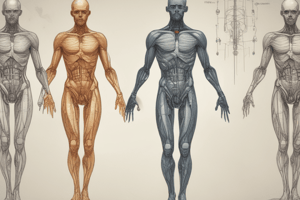Podcast
Questions and Answers
What is the primary method through which water is lost from the body?
What is the primary method through which water is lost from the body?
- Respiration
- Evaporation from skin and lungs (correct)
- Oxidation of foodstuffs
- Lactation
In a 70-kg man, approximately how much water resides in the intracellular fluid (ICF)?
In a 70-kg man, approximately how much water resides in the intracellular fluid (ICF)?
- 21 L
- 14 L
- 28 L (correct)
- 42 L
Which of the following is NOT a function of water in the body?
Which of the following is NOT a function of water in the body?
- Catalytic action
- Heat regulation
- Lubricating actions
- Production of energy (correct)
What percentage of total body water is found in the extracellular fluid (ECF)?
What percentage of total body water is found in the extracellular fluid (ECF)?
How is water supplied to the body through the oxidation of foodstuffs?
How is water supplied to the body through the oxidation of foodstuffs?
What condition occurs when there is an excess of both water and solute in the extracellular fluid?
What condition occurs when there is an excess of both water and solute in the extracellular fluid?
What happens to plasma osmolarity during overhydration?
What happens to plasma osmolarity during overhydration?
Which mechanism primarily regulates fluid levels in the body through its action in the kidneys?
Which mechanism primarily regulates fluid levels in the body through its action in the kidneys?
What condition is indicated by a loss of water without a corresponding loss of solute, resulting in increased plasma osmolarity?
What condition is indicated by a loss of water without a corresponding loss of solute, resulting in increased plasma osmolarity?
Which hormone is released in response to increased plasma concentration of solutes to help regulate fluid balance?
Which hormone is released in response to increased plasma concentration of solutes to help regulate fluid balance?
Flashcards are hidden until you start studying
Study Notes
### Water Homeostasis
- Maintaining water balance within a narrow range is crucial for the body.
- The body utilizes negative feedback loops involving the endocrine and nervous systems for water balance regulations.
- Total Body Water (TBW) in a 70 kg male accounts for about 60% of body weight, with approximately 2/3 in Intra Cellular Fluid (ICF) and 1/3 in Extra Cellular Fluid (ECF).
- The ECF is further divided into the vascular (plasma) and interstitial fluid compartments.
- Water intake occurs through dietary liquids, solid foods, and oxidation of foodstuffs.
- Oxidation of fats, proteins, and carbohydrates yield 107 ml/100 gm, 41 ml/100 gm, and 56 ml/100 gm of water, respectively.
- Water output happens through urine, respiration, lactation, feces, skin/lung evaporation, and tears.
Water Functions
- Solvent: Water's ability to dissolve various substances makes it ideal for cellular processes.
- Catalytic Action: Water's ionizing power speeds up chemical reactions in the body.
- Lubricating Actions: Water acts as a lubricant in joints, pleura, conjunctiva, and peritoneum.
- Heat Regulation: Water's high specific heat prevents extreme temperature fluctuations in the body.
Disturbances of Water Homeostasis
- Hypervolemia: Elevated extracellular fluid volume with normal plasma osmolarity due to excessive water and solute intake.
- Overhydration: Increased volume but decreased plasma osmolarity due to excessive water intake without accompanying solute.
- Hypovolemia: Reduced plasma volume with normal osmolarity caused by simultaneous loss of water and solutes.
- Dehydration: Decreased volume and increased plasma osmolarity due to loss of water without a proportionate loss of solutes.
Mechanisms of Fluid Balance
- Antidiuretic Hormone (ADH): Released by the posterior pituitary in response to increased plasma osmolarity, ADH promotes water reabsorption in the kidneys by increasing water permeability in the late distal convoluted tubule and collecting duct.
- Thirst Mechanism: This mechanism is triggered by dryness in the mouth, increased blood osmotic pressure, decreased blood volume, and ultimately leads to thirst.
- Aldosterone: Released by the adrenal cortex in response to low blood pressure or high potassium levels, aldosterone promotes sodium reabsorption and potassium secretion in the kidneys, contributing to blood volume and pressure regulation.
- Sympathetic Nervous System: Stimulated by low blood pressure, the sympathetic nervous system causes vasoconstriction of the afferent arteriole in the kidney, leading to decreased glomerular filtration rate, less urine production, and renin release.
Effects of Renin-Angiotensin-Aldosterone System
- Renin, released by the kidney's juxtaglomerular cells, triggers the conversion of angiotensinogen to angiotensin I, which is further converted to angiotensin II by ACE.
- Angiotensin II stimulates aldosterone secretion from the adrenal cortex and promotes vasoconstriction.
- Aldosterone increases sodium reabsorption and potassium secretion in the kidneys, contributing to blood volume and pressure regulation.
### Summary of Fluid Balance Regulations
- Osmolarity, blood volume, and blood pressure are tightly regulated through various mechanisms.
- ADH promotes water reabsorption.
- The thirst mechanism regulates water intake.
- Aldosterone controls sodium and potassium balance.
- The sympathetic nervous system adjusts blood flow and filtration rate in the kidneys.
- These mechanisms work in coordination to maintain fluid homeostasis.
Studying That Suits You
Use AI to generate personalized quizzes and flashcards to suit your learning preferences.




